If you were unable to attend the instructional development day on January 10, or simply want to re-watch the morning sessions on AI, the recording is available here. The slideshows used in the sessions are available here. Enjoy! — and please let us know if you have any questions or want to further discuss AI assignments and policies.
Category Archives: Professional Development
Optimizing Learning Objectives for Real-Life Skills
Incorporating real-world skills into college learning objectives benefits students by making their education more relevant, engaging, and valuable. It prepares them for the demands of their future careers and empowers them to adapt and excel in an ever-changing world. Additionally, it aligns with the expectations of employers and contributes to the overall societal benefit of a highly skilled and capable workforce.
When students learn with the intention of applying their knowledge in real-life situations, they are more likely to retain that knowledge and transfer it to new contexts. This promotes deeper learning and long-term retention of skills and concepts. By aligning learning objectives with real-world skills, faculty help students develop practical competencies that are directly applicable to their chosen fields. This preparation enhances graduates’ readiness for the job market and their ability to contribute effectively in their professions.
Teaching real-world skills also encourages students to become adaptable lifelong learners who can thrive in a dynamic and rapidly changing world. When students develop real-world skills during their college education, they gain confidence in their abilities and feel more capable of tackling professional challenges. This self-assurance can positively impact their career trajectories, service perspectives, and contributions to society.
For more advice on incorporating real-life skills into your learning objectives, take a look at this resource: Optimizing Learning Objectives for Real-Life Skills DONLAN IDOLS.
And, for additional support on related topics, please feel free to attend our next open office hours session on Thursday, October 19, from 6:00pm to 7:30pm.
The Benefits of Course Alignment
Alignment – the practice of matching learning content, activities, tools, and assessments with a course’s learning objectives – contributes great value to the teaching and learning ecosystem. By facilitating the growth and improvement of both instructors and institutions while enhancing the learning experience for students, efforts toward an aligned and refined course pay off in improved outcomes. Focusing our approach on evidence-based course design principles that have proven effective in boosting student engagement and retention benefits all stakeholders by demonstrating our dedication to continuous improvement. Bottom line: By promoting high-quality learning experiences, we help to enhance student success – and that’s a solid win for everyone.
While alignment is typically a practice associated with online courses, its benefits permeate into other instructional delivery modalities due to its focus on reliability and relevance. Even engaging in an informal review of your course can provide insight into ensuring that our online, hybrid, and face-to-face courses meet established standards for course design. This helps us maintain a consistent level of quality across the curriculum and also allows us to make necessary adjustments and enhancements to our offerings. The Online Course Basic Standards Rubric can help you get started in evaluating and improving your course for effective alignment. Give it a try!
For additional help with course alignment or other instructional design needs, please reach out to Crystal Donlan, Etown’s Instructional Designer and Online Learning Specialist, at donlanc@etown.edu or contact any member of the Teaching and Learning Design Studio. We look forward to working with you on refining your course!
Creating and Aligning Your Syllabus to Optimize Student Success
Your syllabus is more than a document that contains important information about your class; your syllabus acts as a contract and a covenant between instructor and student by setting the tone, creating an impression, and conveying expectations across the breadth of the learning experience. Crafting an effective, relevant, and thorough syllabus takes time and planning, but the return on this investment is a solid stand-alone piece that will serve as a foundational document for the duration of the course.
The Creating and Aligning Your Syllabus to Optimize Student Success session recording from the SGPS virtual event held on October 27 is now available for viewing! Please feel free to watch the recording at your leisure.
Curated resources on this topic are also available to you. Just scan the QR code below:
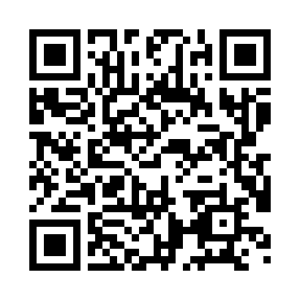
To schedule a design consultation, receive coaching on syllabus writing, or troubleshoot alignment issues in your course, please reach out to Crystal at donlanc@etown.edu or stop by the Teaching and Learning Design Studio in Nicarry Hall! Be well, and keep learning!
Upcoming Professional Development Opportunities
The Etown Teaching and Learning Design Studio is holding a number of professional development events this semester. Mark your calendar – you won’t want to miss these exciting learning opportunities!
Everyone Designs Series
Learner-centered experiences don’t just happen – they are built around a way of thinking that examines cognitive, social, practical, and strategic aspects of learning science to create solid opportunities for growth. This virtual how-to series offers synchronous one-hour brainstorming sessions where participants receive a brief overview of a design-centered issue and then explore innovative solutions. Facilitated by Crystal Donlan, these one-hour Zoom meetings are held at Wednesday and Friday mornings on the following schedule for October through December:
- Friday, Oct.14 at 11:00am: Understanding UDL and Accessibility
- Wednesday, Oct. 26 at 11:00am: Supporting Diverse and Nontraditional Learners
- Friday, Oct. 28 at 11:00am: Supporting Diverse and Nontraditional Learners
- Wednesday, Nov. 16 at 11:00am: Creating Self-Directed Learning Opportunities
- Friday, Nov. 18 at 11:00am: Creating Self-Directed Learning Opportunities
- Wednesday, Dec. 7 at 11:00am: Utilizing Mindful Scaffolding to Foster Belonging
- Friday, Dec. 9 at 11:00am: Utilizing Mindful Scaffolding to Foster Belonging
Leading from Any Level Series
(Facilitator: Crystal Donlan, Instructional Designer & Online Learning Specialist)
The Leading from Any Level virtual roundtable series takes its focus on the premise that all members of the teaching and learning community– regardless of rank or status–possess leadership potential and professional authority. This series combines synchronous one-hour discussion sessions via Zoom in unison with an asynchronous mobile app to connect and inform the collective narrative on relevant professional growth topics. This learning experience takes place entirely from digital spaces, so participants can join from anywhere! Zoom meetings are held Thursday afternoons on the following schedule for October through December:
- October 20 at 2:00pm: Examining Issues of Power in Teaching and Learning
- November 10 at 2:00pm: Leading from Where You Are
- December 1 at 2:00pm: Balancing Politics and Practice
Quick Canvas Series
Join Sharon Birch for Quick Canvas sessions. Each Zoom session consists of a 10-minute demonstration followed by time for questions. For those of you who can’t make it, sessions will be recorded and posted in the Faculty Development site in Canvas.
Upcoming sessions will take place on:
- October 11 at 12:30 – New Quizzes vs. Classic Quizzes
- October 25 at 12:30 – Printing/Creating PDF versions of Quizzes
- November 8 at 12:30 — New Quizzes vs. Classic Quizzes
- November 29 at 12:30 – Setting up a Rubric
Subscribe to News from the Teaching and Learning Design Studio for updates on the programming schedule. If you’d like to be on our 2022-23 professional development mailing list, please complete this form. And as always, you can contact the Studio at studio@etown.edu with any other questions or ideas you may have.
Elizabethtown College Learning Design Fellowship program
The Etown Teaching & Learning Design Studio and the office of the Dean of Faculty and Associate Provost for Student Learning invite proposals to the Elizabethtown College Learning Design fellowship program. The program, which is intended to supplement rather than supplant existing professional development resources such as the Faculty Grants program and Professional Development Funds, is designed to afford individual faculty members the opportunity to advance their Scholarship of Teaching and Learning agenda and to serve as campus leaders in particular areas of focus. Areas of emphasis might include: interdisciplinary teaching and learning, integration of community-engaged learning, teaching strategies for challenging courses, advising and mentoring to promote student success, integration of diverse perspectives, organizational change, use of instructional technology to foster student engagement and/or promote economy of faculty time, online teaching and learning, etc.
Learning Design Faculty Fellow Expectations:
- Attend quarterly meetings with the Etown Teaching & Learning Design Studio team during the fellowship appointment.
- Implement a newly designed initiative in the Spring 23, Fall 23 or Spring 24 terms.
- Showcase results and share expertise at an Elizabethtown College faculty workshop during the 23-24 academic year.
- Create at least one deliverable (article, white paper, module) for faculty use and, ideally, for presentation to a professional audience.
- Assess and evaluate the project and provide a summary report.
- Act as a resource for faculty colleagues, the Professional Development Committee, and the Teaching & Learning Design Studio.
Eligibility. All full‐time faculty and instructional staff members in the traditional program or SGPS in any area or discipline are eligible to apply. Applicants must commit to attend all Faculty Fellows meetings or workshops, implement the proposal in the Spring 23, Fall 23 or Spring 24 academic terms, share expertise as part of the ongoing professional development offerings at the College, and evaluate and assess the project as part of a full report. Following completion of the Fellowship, Faculty Fellows are invited to participate in networking gatherings to meet and support incoming Fellows and to support the Teaching and Learning Design Studio and the Professional Development Committee as available.
How to Apply: Download the application attached to this post (Learning Design Faculty Fellows Program Call Oct2022 ) or send an email to studio@etown.edu to request an application. Applications may be submitted to studio@etown.edu . All submissions must be submitted by October 31, 2022.
The Leading from Any Level Workshop Series Starts Tomorrow!
Leading from Any Level Series
The Leading from Any Level workshop series takes its focus on the premise that all members of the teaching and learning community – regardless of rank, status, or title – possess leadership potential and professional authority. This series combines synchronous one-hour discussion sessions via Zoom in unison with an asynchronous mobile app to connect and inform the collective narrative on relevant professional growth topics.
This learning experience takes place entirely within digital spaces, so participants can join from anywhere! Zoom meetings are held Thursday afternoons at 2:00pm on the following schedule:
September 29 Becoming a Critically Reflective Practitioner
October 20 Examining Issues of Power in Teaching and Learning
November 10 Leading from Where You Are
December 1 Balancing Politics and Practice
February 2 Initiating Crucial Conversations
February 23 Navigating Conflict with Empathy
March 16 Dealing with Professional Uncertainty
April 6 Embracing Institutional Culture
If you are interested in learning more about this series, please contact Crystal Donlan at donlanc@etown.edu. (No RSVP is necessary to participate! )

Culture of Coaching Blog Series Post #4: Recommending Reading
by Katie Caprino
As we round out our Culture of Coaching Blog Series this academic year, I want to recommend some book titles that may be helpful as you think about how coaching may play out in your role at Elizabethtown College.
In this blog post, I recommend four texts (three books and one article) and related resources to help you consider your coaching work.
Better Conversations: Coaching Ourselves and Each Other to Be More Credible, Caring, and Connected by Jim Knight
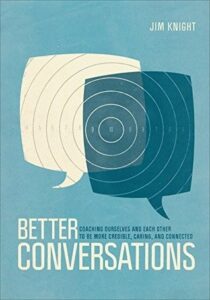
Jim Knight (follow him @jimknight99 on Twitter), partner of the Instructional Coaching Group, wrote a book that was a part of my instructional coaching program. Better Conversations: Coaching Ourselves and Each Other to Be More Credible, Caring, and Connected includes commentary and exercises to help all of us have better conversations. The conversation tips in the book can be applied to our coaching work, of course, but also to our work with our colleagues and advisees. I left this book feeling more prepared to have meaningful conversations, which I believe are at the core of what we have been talking about in this blog series on coaching but also at the core of what we do at Elizabethtown College. Tools related to Better Conversations can be found here.
The Art of Coaching by Elena Aguilar
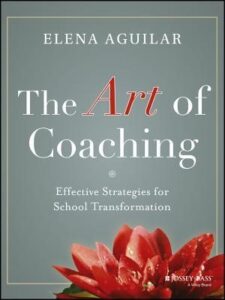
When I was first starting out with my teacher supervision work about a decade ago, a colleague recommended Elena Aguilar’s (follow her on Twitter @brightmorningtm) The Art of Coaching: Effective Strategies for School Transformation. This book articulates the importance of coaching on school transformation, defines coaching, and gives advice on listening and conversing during coaching cycles. Aguilar is the founder and CEO of Bright Morning Consulting, and you can find several downloadable tools, including reading guides and tools related to the book, here.
If you are looking for other books by Aguliar, you can check out The Art of Coaching Teams; Coaching for Equity: Conversations That Change Practice; and an upcoming title: The PD Book: 7 Habits that Transform Professional Development, written with co-author Lori Cohen (follow her on Twitter @lcctchr). You can listen to a podcast about this upcoming book here.
Literacy Coaching: Transforming Teaching and Learning with Digital Tools and Technology by Stephanie Affinto
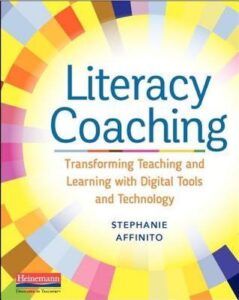
Stephanie Affinto (follow her on Twitter @AffinitoLit]’s book Literacy Coaching: Transforming Teaching and Learning provides ways to coach using digital tools. Although written with PK-12 school-based literacy coaches in mind, this book can help us think about ways to develop digital coaching practices here at Elizabethtown College. Affinito’s online The Coaching Sketchnote Book provides several resources that can help you in your coaching practice.
Coaching Conversations: Transforming Your School One Conversation at a Time by Linda M. Gross Cheliotes and Marceta F. Reilly’s
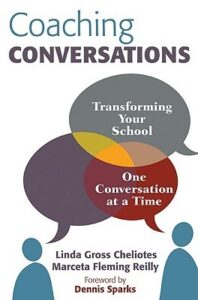
After articulating what a coaching conversation entails, Linda M. Gross Cheliotes and Marceta F. Reilly provide ideas for asking powerful, meaningful questions and shares ways colleagues can engage in reflective feedback. These strategies could be especially helpful in coaching cycles dedicated to teaching.
In their article in the journal Innovative Higher Education, Huston (follow her on Twitter @ThereseHuston) and Weaver provide ideas about how to start a coaching program for faculty members. They provide ideas about reciprocal coaching and one-on-one coaching by trained coaches. They then share six tips for a successful peer coaching program: goal-setting, voluntary participation, confidentiality, assessment, formative evaluation, and institutional support. We can perhaps use these tips as we plan for how coaching might look on our Etown campus. Huston also published a 2021 book about effective feedback: Let’s Talk: Making Effective Feedback your Superpower.
As we continue to envision a culture of coaching on our campus, please share other book or article recommendations that may be helpful as we move forward!
Revising your Syllabus with The First Day Toolkit
In a recent article posted to Inside Higher Ed Maria Carrasco features a new resource that provides instructors and professors set of tools one can use to create syllabi that are more inclusive and supportive. The resource featured is The First Day Toolkit, which is a free online course developed by The Student Experience project. The course covers matters like: developing a growth mindset in your course design, normalizing challenges, and communicating care to your students.
While late-April is not the ideal time to review and revise syllabi for the upcoming academic year, we invite you to bookmark this resource so that you can return to it when the timing is right. If you decided to embark on a syllabus revision project and you would like to partner with someone in the process, please let us in the Studio know.
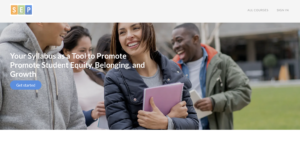
The Student Experience Project is a collaborative of university leaders, faculty, researchers and national education organizations committed to innovative, research-based practices to increase degree attainment by building equitable learning environments and fostering a sense of belonging on campus.
Using Rubrics to Clarify Expectations
Instructors can use rubrics as a tool within the learning environment both to convey their expectations to students and to delineate their grading criteria. As a highly customizable tool, rubrics should be built and scaled based on the assignment they are purposed to assess. This, of course, rather demands an initial investment not only to develop learning activities but to design appropriately scaled assessment rubrics. Below is a list of resources that can help get you started on rubric development for your course assignments – but these tools are not one-size-fits-all. Starting small with a more widely applicable rubric may help you delineate some expectations for a set of assignments and/or a smaller project. Over time, you may wish to expand your rubric use to culminating projects, essays, and lab reports.
As always, we at the Etown Teaching and Learning Design Studio would love to help you develop these helpful and specific learning assessment tools! Please feel free to reach out to us if you would like an instructional design consultation to discuss your vision and to brainstorm ideas for using rubrics in your class.
AAC&U VALUE Rubrics (American Association of Colleges and Universities)
Beyond Fairness and Consistency in Grading The Role of Rubrics in Higher Education 2020
Creating and Using Rubrics (Eberly Center for Teaching Excellence at Carnegie Mellon University)
Grading Rubrics: Sample Scales (The Sheridan Center for Teaching and Learning at Brown University)
Learning Maps for Ten Essential Learning Outcomes (Stockton University)
Using Rubrics (Center for Teaching Innovation at Cornell University)
